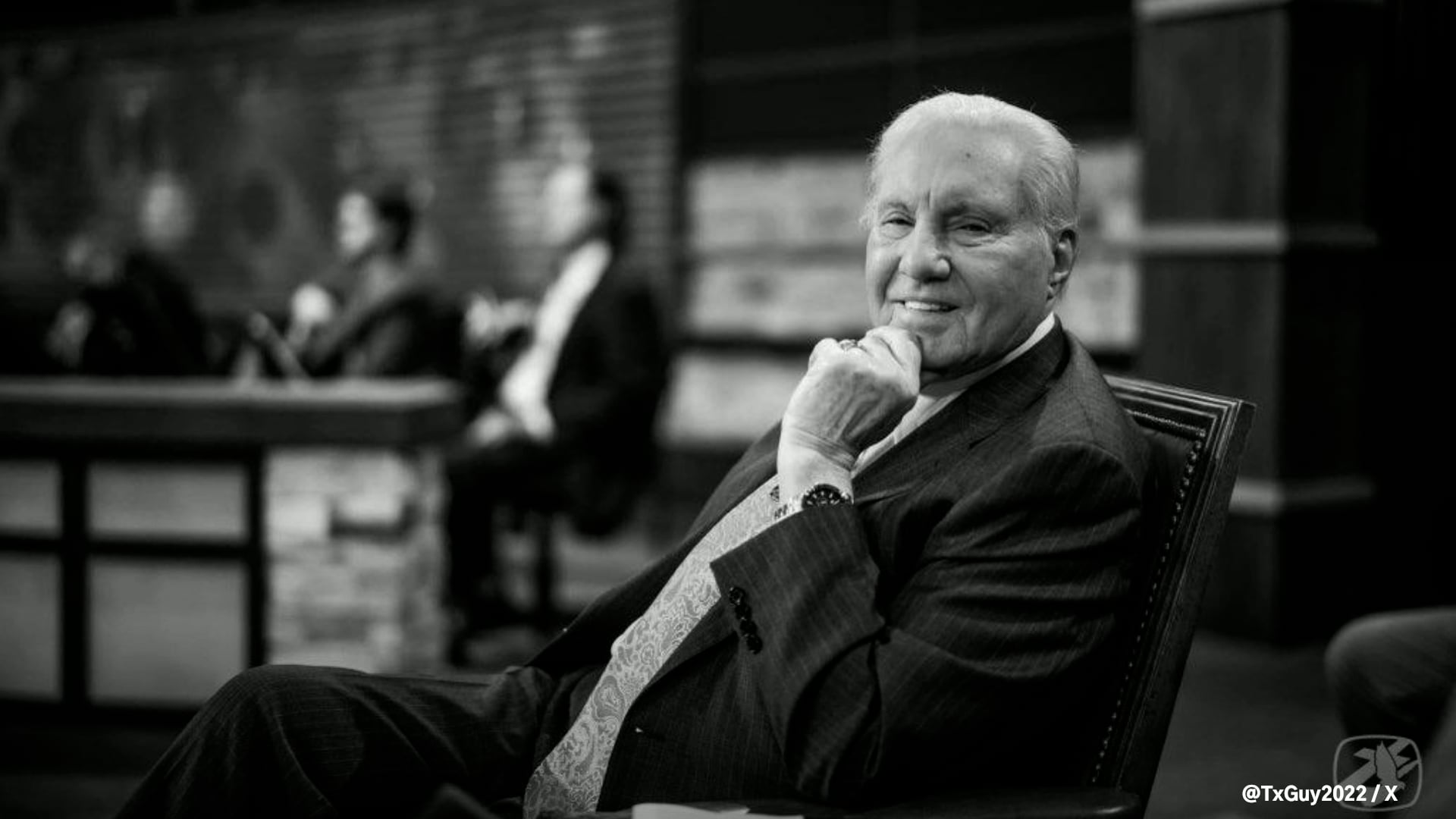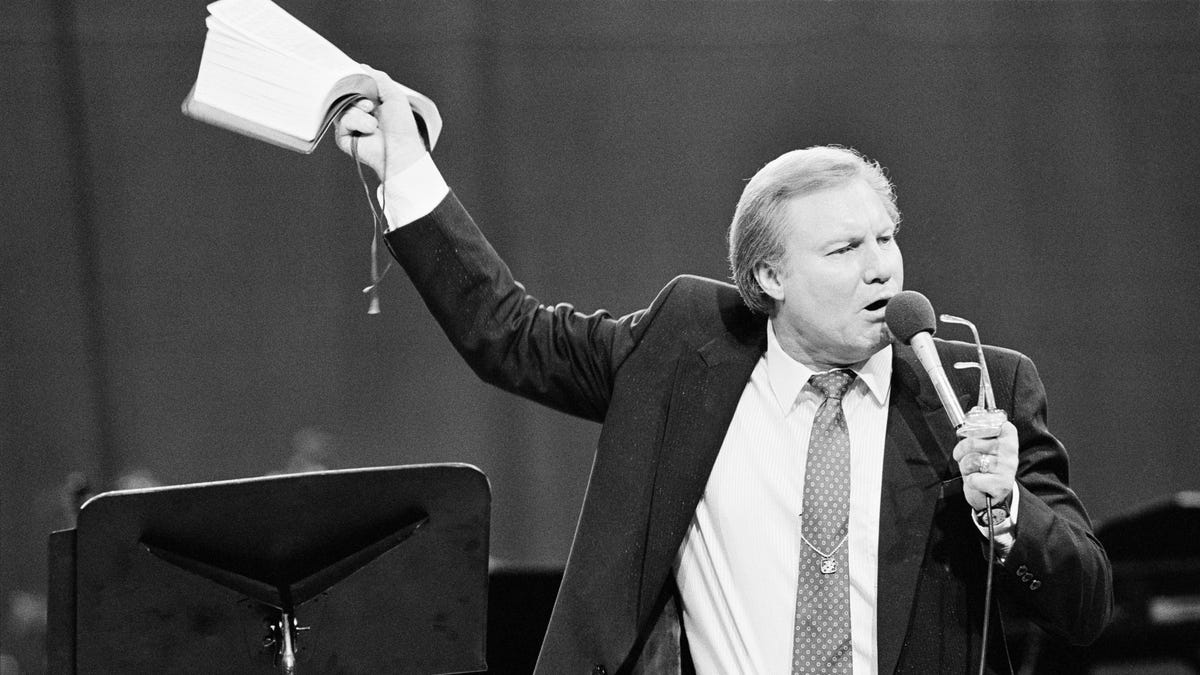Swaggart embodied the transition from traveling evangelist to radio preacher and then televangelist, garnering huge audiences along the way.

Rev. Jimmy Swaggart dies at 90 following cardiac arrest
Jimmy Swaggart, the Pentecostal televangelist, has died at age 90. He passed away in a Louisiana hospital after going into cardiac arrest in mid-June, according to a statement from his family.
unbranded – Newsworthy
Before his career ended in shame, televangelist Jimmy Swaggart was a pioneering legend, a magnetic preacher and performer whose mastery of both pulpit and piano earned a groundbreaking national and global following.
Along with Robert Schuller and Jerry Falwell, the Louisiana-born televangelist was among the primary trailblazers and, at his 1980s peak, one of the most familiar faces in Christian television, bringing an expressive Pentecostal-style of worship into the evangelical mainstream.
“His preaching on television was particularly powerful because of his facial expressions,” said Quentin Schultze, professor emeritus of communication at Calvin University in Grand Rapids, Michigan. “He helped lead many viewers to a more charismatic style of worship.”
Swaggart, who died Tuesday morning at age 90, was a riveting and dramatic preacher, said Randall Balmer, a professor of religion at Dartmouth College, a private university in Hanover, New Hampshire.
“He pulled out all the stops – the tears, the exclamations,” Balmer said. “He understood pacing and had an innate sense of how to manipulate people.”
Swaggart, he said, embodied the transition from traveling evangelist to radio preacher and then televangelist, garnering huge audiences along the way.
“He was phenomenally successful at each one of those iterations,” said Balmer, author of “Mine Eyes Have Seen the Glory: A Journey into the Evangelical Subculture of America.”
Swaggart pursued full-time ministry in 1955 and in 1969 launched “The Campmeeting Hour,” broadcasting on more than 700 radio stations around the country. Four years later, “The Jimmy Swaggart Telecast” would pivotally put him in front of a television audience.
At the time, well-financed preachers could purchase nationally syndicated, Sunday morning airtime with the potential of reaching large audiences, Schultze said. Swaggart was among the few able to significantly capitalize on that opportunity, mastering the small screen with his intensely emotional delivery.
In the 1970s and 1980s, television was really “a medium of the face,” said Schultze, author of “Televangelism and American Culture.” “Not so much anymore, because of big screens, but back then most visual expression came from the face, and he had a very expressive face, along with his musical voice.”
Swaggart’s show would eventually air in more than 100 nations weekly. At his peak, according to the publication 64 Parishes, Swaggart’s TV ministry would reach more than 2 million Christians around the globe.
“There was a time when 30% of all Americans who had their televisions on, on Sunday mornings, were tuned into Swaggart,” Schultze said.
By the time sex scandals sledgehammered Swaggart’s career in the late 1980s and early 1990s, cable and satellite TV, and eventually the internet, would make it “virtually impossible” to attract the volume of viewership he achieved in his heyday, Schultze said. Religious audiences had become balkanized and many stations had discontinued paid programming.
“There was a short window where if you were a great television entertainer and could hire an advertising marketing agency to promote you, you could get some tremendous audiences,” Schultze said. “That’s gone now, and there won’t be anyone on TV or on the internet who’s as popular as these guys were.”
Preacher’s rise and fall ‘a cautionary tale’
Swaggart, Schultze said, was a gifted singer with an affected, heartfelt style. As a younger man, he’d pondered a secular music career; his cousins were rock-and-roll icon Jerry Lee Lewis and country star Mickey Gilley.
Instead, he chose the ministry, infusing traditional hymns with emotionally delivered, country music arrangements, upending notions of what Christian music could be and bringing mainstream legitimacy to Pentecostal-style worship.
Swaggart sold 17 million gospel albums, though his enduring “Southern gospel version of contemporary music” continues to divide churches today, Schultze said.
“Pentecostalism was always kind of tribal and seen as outside mainstream evangelical faith,” Schultze said. “He brought it more into the center, and what became a lot of its faith and worship music was partly of his influence.”
Had his career not been felled by his own missteps, Swaggart likely could have continued on, Schultze said.
In 1988, Swaggart was embroiled in a scandal involving a sex worker, leading to his legendary “I have sinned” apology delivered on live television.
The incident led to Swaggart’s suspension and then defrocking by the Assemblies of God, though he would eventually continue preaching without a denomination.
“He realized that unless he got back to TV he would lose everything,” Balmer said. “He needed that huge influx of money and made a calculated decision to defy suspension and go back on his own as an independent. It didn’t work out all that well for him.”
A second scandal in 1991 would set Swaggart back for good. Balmer, who visited him in Baton Rouge while researching a 1998 magazine piece about the disgraced preacher, said Swaggart struggled mightily after his fall from grace.
“The whole enterprise was a shadow of its former self,” Balmer said. “He’d had a whole empire, a bible college and various missionary organizations. I don’t know how many acres he had in Baton Rouge but it was a large complex. And it was a ghost town by then.”
Ultimately, Balmer said, Swaggart’s legacy may be a cautionary tale.
“Here’s somebody who rose to the pinnacle of evangelical stardom and through a series of missteps utterly destroyed his reputation and ministry,” he said. “There were a few hangers-on to be sure, but by the time I got there 10 years later, the crowds of thousands were down to dozens.”
While Swaggart’s rise had been concurrent with the rise of the Moral Majority, the political organization founded by Falwell that helped elect Presidents Ronald Reagan and George H.W. Bush and made the religious right a political force, politics was never his game.
“He was all about preaching and the music,” Schultze said. “Sitting at the piano and doing an emotional hymn. None of the other TV evangelists could do that.”
Contributing: Natalie Neysa Alund; Greg Hilburn, USAT Network










